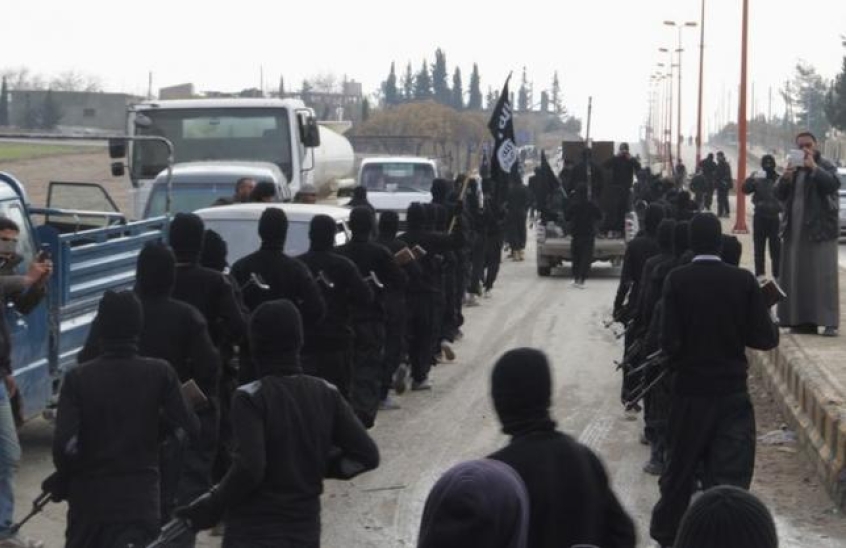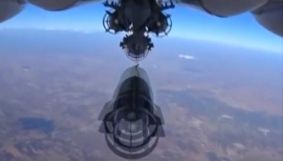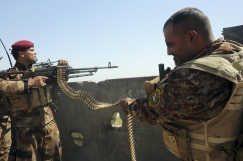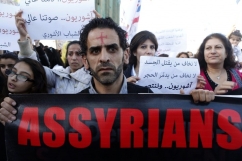
The list of Islamic States crimes makes the blood curdle and the skin crawl. These people have done terrible things.
- They drove 600 Shia, Christian, and Yazidi male prisoners into the middle of the desert, lined them up along the edge of a ravine and executed them at point blank range, according to Human Rights Watch.
- A UN Committee on the Rights of the Child report in February referred to the "systematic killing of children belonging to religious and ethnic minorities by the so-called ISIL, including several cases of mass executions of boys, as well as reports of beheadings and crucifixions of children and the burying of children alive".
- In the western Iraq town of Al-Baghdadi they burned 45 people alive.
- In an interview with Middle East Eye, Zainab Bangura, the UN envoy on sexual violence in conflict, described what life under Islamic State was like for women. They are stripped, girls are tested for virginity, sold and traded – one was traded 22 times. According to Bangura: "They commit rape, sexual slavery, forced prostitution and other acts of extreme brutality. We heard one case of a 20-year-old girl who was burned alive because she refused to perform an extreme sex act.
"We learned of many other sadistic sexual acts. We struggled to understand the mentality of people who commit such crimes."
Enough.
But we all struggle to understand the mentality of people who commit such crimes. Were they born with a lust to rape and kill, and is it that Islamic State just lets them do it? But there are so many of them. So is it even worse – that lots of us – particularly men – have these instincts and that it's just social controls and the rule of law that stop us doing the same? Is civilisation, in CP Snow's phrase, just a coat of varnish?
Or is it even worse than that?

The stories we're hearing from Iraq and Syria are terrible. But they are not, in the scheme of things, uniquely evil, and that makes them more terrible still. Throughout history, stories just as dreadful have been told. They are being told today, and not just in the Middle East or Afghanistan: there are African countries where the geopolitical stakes are not as high where things just as bad are being done. It's just that there's no internet.
People do bad things and they always have. That's shouldn't surprise anyone who reads the Bible. We're a fallen race; there's a twist in our nature that sends us off course. We continually miss the mark.
But some acts seem to have a particular quality of evil about them which goes beyond that. They aren't just wrong: they're demonic. And it seems to me that we shouldn't be scared to say that, and that often we are. CS Lewis famously said that we could fall into one of two errors about the Devil: not thinking about him enough, or thinking about him altogether too much. Today, in our rational, technical, cynical world, it's the former that's the risk.
One problem is that there's a whole sub-Christian mythology about the Devil that's grown up over the centuries. So when we think about the demonic, our minds leap to films like The Exorcist or The Omen. Lewis himself played with this when he wrote The Screwtape Letters, imagining an older demon instructing a younger one in how to tempt his 'patient'.
We know, if we have any sense, that the demonic has nothing to do with this. The Devil doesn't have horns and a tail. Neither is he a sort of equal-but-opposite version of God. If we don't pay attention during sermons it isn't because of demonic assault, but because we stayed up too late last night or because the preacher is boring. Usually, 'the Devil made me do it' is just an excuse for laziness or lack of self-control. We don't need to bring the spiritual forces of wickedness into it; we're quite capable of behaving badly on our own account.
But sometimes acts strike us as having a quality of evil about them that lifts them on to a different plane. And they might not involve bloodshed or violence, either: evil can be grey as well as scarlet. I have known one or two people in my life whose small, destructive tyrannies have made my flesh creep. I wouldn't hesitate to describe their actions as demonic.
The Bible takes for granted the existence of a spiritual opposition to God and goodness. It is not really systematic in its treatment of the matter, and we should, I think, be wary about being too definite in our exegesis; one person's demoniac is another person's schizophrenic.
But the horror that we feel at particular kinds of evil, the sense of oppression and helplessness that we have when we are confronted with it, as though we are being overwhelmed by an alien force, might sometimes be an indication that we are face to face with something more than normal wickedness.
And perhaps the demonic is unleashed most powerfully when it has groups to work with, rather than just individuals. Famously, one of the earliest reports of the Rwandan genocide contained the line: "There are no devils in hell any longer. They are all in Rwanda." The impulse toward evil was amplified and validated because other people were doing it too. It became normal, and around 800,000 people died because of it. It happened with the child soldiers in Joseph Kony's Lord's Resistance Army: they were socialised into murder, torture and rape, and that became normal too.
The same is happening under Islamic State. Evil has become normal, and that is demonic.
Does it make any difference to how we see what they do? I think so. It reminds us that no matter what these people have done, they are not, fundamentally, any different from us. They share in the same human nature, but they have fallen prey to the forces of evil. They are responsible, but they are also victims of a greater Enemy.
When the only response the world has is Cruise missiles and airstrikes, that might help to recall us to something distinctively Christian: to pray for them and to work for their redemption, not just their punishment.
It's completely counter-cultural to say this today, but: the murderers, rapists and torturers of Islamic State are no less loved by God after their crimes than they were before. If Christians are not willing to remind the world of this, who will?
Follow @RevMarkWoods on Twitter.

















